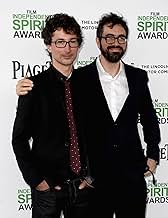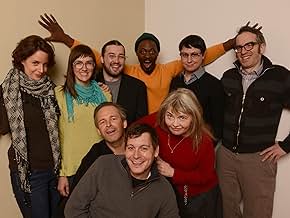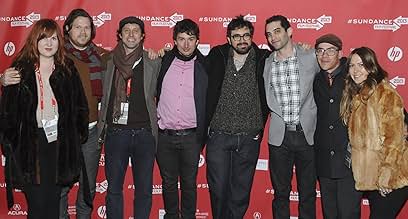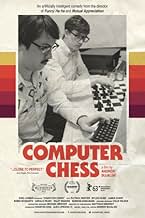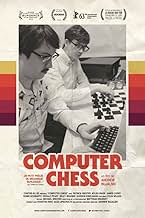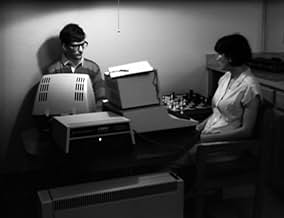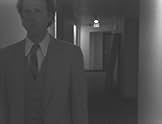Eine Geschichte aus den 1980er Jahren, die sich um ein Schachturnier Mann gegen Maschine dreht.Eine Geschichte aus den 1980er Jahren, die sich um ein Schachturnier Mann gegen Maschine dreht.Eine Geschichte aus den 1980er Jahren, die sich um ein Schachturnier Mann gegen Maschine dreht.
- Regie
- Drehbuch
- Hauptbesetzung
- Auszeichnungen
- 2 Gewinne & 8 Nominierungen insgesamt
- Reini Urban
- (as Daniel C. Metz)
Empfohlene Bewertungen
When I enjoy a film that falls in line with the mumblecore movement, bearing a micro-budget, naturalistic dialog, simple but thoughtful acting, themes classified under the title of social realism, and a basic plot that offers much discussion, I'll talk about it for days and write a long, healthy review of the film. When I don't enjoy a film of the mumblecore movement, I'll struggle for sometimes over an hour trying to summarize why I didn't enjoy it. Films like these rely so heavily on character and realism that not liking the film likely means that you didn't like the characters for some reasons.Your tolerance for simplicity, tone, and character needs to be relatively high or the film is likely to escape you. Computer Chess escaped me early on and neither I nor it every reconnected.
The story concerns a computer chess tournament circa 1980's, when the home-computer/computer revolution was jut gaining momentum. People were in awe at the fact that a person can play a machine in a game like chess and have a chance at losing. The power of a machine shaped like a large box was greatly underestimated and tournaments for computer chess and other basic video games became relatively common. The picture is aesthetically complete, showing the players as probably how they were. Many of them wore button-down shirts, vests over their shirt, pocket-protectors, thick-rimmed glasses, had neatly combed hair and a fine-trimmed mustache, along with the benefits of khaki pants and their brain power.
Long story short, they were geeky, but they also were the reason why computers advanced so much in such a relatively short period of time. One look into the history books - or this film, in particular - and you see their equipment was clunky, slow, and unreliable. If they wanted better materials, they couldn't utilize the internet to their advantage. All they could do was do what they could with what they had, and they became the technical pioneers of a larger-than-life industry that many of us take for granted today.
Writer/director Bujalski does a nice job on the environment and the atmosphere of the picture, making the entire project have the look and possibly the aroma of a 1980's chess tournament. The computer and software equipment they had defines the very principles of primitive technology, and Bujalski shows this by incorporating memorable computer sounds of the time, along with the believable execution of an early computerized chess tournament. The black and white photography the film bears only emphasizes this quality. It also helps a film with weak or uninteresting material to make up for it in the aesthetic department, but unfortunately, Computer Chess can't entirely rebound.
Reviews of Computer Chess have marveled at the existential value of the picture. Most everyone has hailed the set design and the aesthetic work (my sole attraction before and after watching the film). And some claim that there's a great meditative style to the picture that offers a valuable viewing. I was free of almost everything in that vicinity watching the film. Bujalski's commitment to recreating an odd, specific time-frame in history deserves significant recognition, but the story he concocts around alienating characters leaves a lot to be desired. When admiration for the history subsides and fascination with aesthetics simmers, what you have is another film with a tiresome story. Like peeling away at the unique looks of a human being to find we're the same on the inside; that's never any fun.
Starring: Kriss Schludermann, Tom Fletcher, and Wiley Wiggins. Directed by: Andrew Bujalski.
This movie is the real deal: it's what we used to go to the movies for. Complexity, surprise, enthrallment, humor, enigmas, revelations. Ambiguity. Somehow a bunch of people down in Austin, Texas made the perfect movie.
The filming, the conversation, the characters are all very life like for that day and age. The realism is also one of its shortfalls, because at times it's a bit boring.
7/10
Wusstest du schon
- Zitate
Pauline: Peter, did you ever stop and ask yourself how many squares are on a chess board?
Bishton: 64. It's an 8 by 8 grid.
Pauline: Well... but don't you see how limited that is?
Bishton: No, it's actually very complex once you start to think about it as a programming problem. Just the number of possible games explodes exponentially with each move, it's close to 10 to the 120th power. And to try and compute all those games might take even longer than humanity would be around to do so.
- Crazy Credits"Mysterious Woman ... herself"
- VerbindungenFeatured in The 2014 Film Independent Spirit Awards (2014)
- SoundtracksNothin' But Changin'
By Collie Ryan
Top-Auswahl
- How long is Computer Chess?Powered by Alexa
Details
Box Office
- Bruttoertrag in den USA und Kanada
- 102.041 $
- Eröffnungswochenende in den USA und in Kanada
- 9.683 $
- 21. Juli 2013
- Weltweiter Bruttoertrag
- 127.852 $
- Laufzeit
- 1 Std. 32 Min.(92 min)
- Farbe
- Seitenverhältnis
- 1.33 : 1


